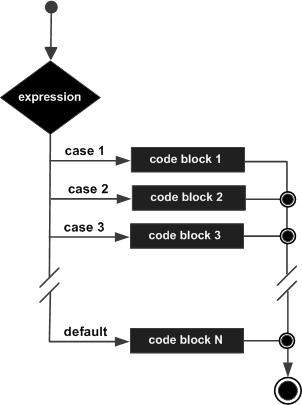Go - The Switch Statement
A switch statement allows a variable to be tested for equality against a list of values. Each value is called a case, and the variable being switched on is checked for each switch case.
In Go programming, switch statements are of two types −
Expression Switch − In expression switch, a case contains expressions, which is compared against the value of the switch expression.
Type Switch − In type switch, a case contain type which is compared against the type of a specially annotated switch expression.
Expression Switch
The syntax for expression switch statement in Go programming language is as follows −
switch(boolean-expression or integral type){
case boolean-expression or integral type :
statement(s);
case boolean-expression or integral type :
statement(s);
/* you can have any number of case statements */
default : /* Optional */
statement(s);
}
The following rules apply to a switch statement −
The expression used in a switch statement must have an integral or boolean expression, or be of a class type in which the class has a single conversion function to an integral or boolean value. If the expression is not passed then the default value is true.
You can have any number of case statements within a switch. Each case is followed by the value to be compared to and a colon.
The constant-expression for a case must be the same data type as the variable in the switch, and it must be a constant or a literal.
When the variable being switched on is equal to a case, the statements following that case will execute. No break is needed in the case statement.
A switch statement can have an optional default case, which must appear at the end of the switch. The default case can be used for performing a task when none of the cases is true. No break is needed in the default case.
Flow Diagram

Example
Live Demo
package main
import "fmt"
func main() {
/* local variable definition */
var grade string = "B"
var marks int = 90
switch marks {
case 90: grade = "A"
case 80: grade = "B"
case 50,60,70 : grade = "C"
default: grade = "D"
}
switch {
case grade == "A" :
fmt.Printf("Excellent!\n" )
case grade == "B", grade == "C" :
fmt.Printf("Well done\n" )
case grade == "D" :
fmt.Printf("You passed\n" )
case grade == "F":
fmt.Printf("Better try again\n" )
default:
fmt.Printf("Invalid grade\n" );
}
fmt.Printf("Your grade is %s\n", grade );
}
When the above code is compiled and executed, it produces the following result −
Excellent! Your grade is A
Type Switch
The syntax for a type switch statement in Go programming is as follows −
switch x.(type){
case type:
statement(s);
case type:
statement(s);
/* you can have any number of case statements */
default: /* Optional */
statement(s);
}
The following rules apply to a switch statement −
The expression used in a switch statement must have an variable of interface{} type.
You can have any number of case statements within a switch. Each case is followed by the value to be compared to and a colon.
The type for a case must be the same data type as the variable in the switch, and it must be a valid data type.
When the variable being switched on is equal to a case, the statements following that case will execute. No break is needed in the case statement.
A switch statement can have an optional default case, which must appear at the end of the switch. The default case can be used for performing a task when none of the cases is true. No break is needed in the default case.
Example
Live Demo
package main
import "fmt"
func main() {
var x interface{}
switch i := x.(type) {
case nil:
fmt.Printf("type of x :%T",i)
case int:
fmt.Printf("x is int")
case float64:
fmt.Printf("x is float64")
case func(int) float64:
fmt.Printf("x is func(int)")
case bool, string:
fmt.Printf("x is bool or string")
default:
fmt.Printf("don't know the type")
}
}
When the above code is compiled and executed, it produces the following result −
type of x :<nil>



